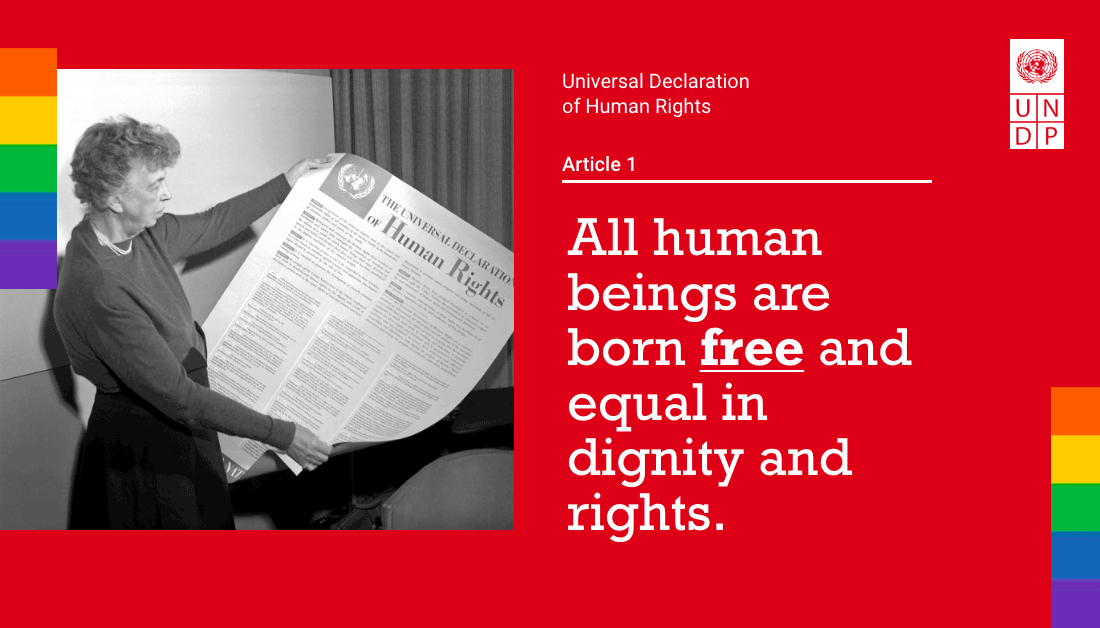Today marks the 18th International Day Against Homophobia, Biphobia and Transphobia, a day in which actions around the world highlight the discrimination and threats faced by LGBTI+ people. Read more about the history of this day at the post end.
Below we have a statement from the United Nations Development Programme:
“Deeply-embedded homophobic and transphobic attitudes and social norms leave many lesbian, gay, bisexual, transgender, queer and intersex (LGBTQI+) people extremely vulnerable to discrimination. Far too often, LGBTQI+ people are singled out for hate-motivated violence, or even murdered. Many are mistreated and even disowned by their own families. This has led to LGBTQI+ people, of all ages and around the world, being among those left furthest behind as countries pursue the Global Goals.
There has been notable progress. From 1990 to 2023, the number of countries criminalizing private, consensual same-sex relationships decreased from 113 to 64. In many countries, social norms are also becoming more accepting. Nevertheless, there are chasms to cross. In those countries where discriminatory laws persist, individuals are exposed to the risk of arrest, prosecution and imprisonment. Regrettably, a small number of countries have even begun to consider extending existing criminalization, even to the point of considering bans on relevant work by human rights defenders and introducing the death penalty for so-called “aggravated homosexuality”. There can never be a justification for such egregious violations of human rights.
At the United Nations Development Programme (UNDP), the leave no one behind principle — with its promise to end discrimination and exclusion — is embedded in our efforts to support countries to repeal laws that discriminate against LGBTQI+ people; to protect human rights; and to support social inclusion. Working with a wide range of partners from the United Nations (UN) and beyond, UNDP has contributed to recent successful decriminalization in countries including Angola, Barbados, the Cook Islands, and Saint Kitts and Nevis. Through initiatives like Being LGBTIQ+ in the Caribbean and #WeBelong Africa, UNDP is working with countries to enrich their data collection related to LGBTQI+ populations to ensure that state services, including healthcare, are more responsive to their needs. We are also supporting the development of laws and policies for gender affirmation in countries such as Viet Nam; addressing the personal data protection of LGBTQI+ people in Georgia; and integrating attention to LGBTQI+ issues in Namibia’s sustainable development strategies.
The promotion of inclusion and challenging discrimination are central tenets of the UN. At UNDP, we uphold the principles of participation, inclusion, equality, and non-discrimination in all of our projects and programmes — everything from building peace to tackling climate change. Our Code of Ethics, which identifies our shared ethical standards as UNDP personnel, includes the expectation that we promote the advancement of LGBTQI+ issues. UNDP’s Gender Parity Strategy broadens the scope of our gender inclusion agenda to embrace people of all gender identities. Our HIV and Health Strategy includes a focus on repealing discriminatory laws against LGBTQI+ people that undermine public health results while our governance programme supports the increased participation of sexual and gender minorities in elections. Indeed, all of us must play a part in speaking out against the hate, discrimination, and violence that many LGBTQI+ people face on a daily basis. Together, we can help to end this insidious state of constant fear that stifles too many lives, and progress by our global community”
Achim Steiner, Administrator, United Nations Development Programme (UNDP)
History of IDAHOBIT Day:
The day, as a concept, was conceived in 2004. A year-long campaign culminated in the first International Day Against Homophobia on May 17, 2005. 24,000 individuals as well as organizations such as the International Lesbian and Gay Association (ILGA), the International Gay and Lesbian Human Rights Commission (IGLHRC), the World Congress of LGBT Jews, and the Coalition of African Lesbians signed an appeal to support the “IDAHO initiative”. Activities for the day took place in many countries, including the first LGBT events ever to take place in the Congo, China, and Bulgaria. In the UK, the campaign was coordinated by the Gay and Lesbian Humanist Association (GALHA)
The date of May 17 was specifically chosen to commemorate the World Health Organization’s decision in 1990 to declassify homosexuality as a mental disorder.
In 2009, transphobia was added to the name of the campaign, and activities that year focused primarily on transphobia (violence and discrimination against transgender people). A new petition was launched in cooperation with LGBT organizations in 2009, and it was supported by more than 300 NGOs from 75 countries, as well as three Nobel Prize winners (Elfriede Jelinek, Françoise Barré-Sinoussi, and Luc Montagnier). On the eve of May 17, 2009, France became the first country in the world to officially remove transgender issues from its list of mental illnesses.
Be an ally to your LGBTI+ friends and neighbours – challenge homophobia and remember that “All human beings are born free and equal in dignity and rights” (Universal Declaration of Human Rights)




